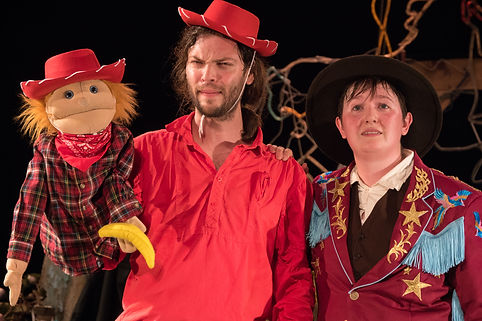
THE COWBOY IS A TOMBSTONE
(review)
THE COWBOY IS A TOMBSTONE (REVIEW)
By Lynn Tofil
Published August 15th, 2023

A young cowboy sings into the night, his tone humble and tender. His eyes fixate softly on a campfire, his shoulders hang weary on his back from a long day of work. The cowboy is Turner Jackson, who is met by Hank, a more jaded, veteran cowboy. They review their day to the distant sound of river frogs. Turner shares a dream he had: how he was wading into the ocean, floating above it, inflated like a raft, then in the next moment sucked underneath it into darkness. “What do you think it means?” he asks Hank. Taken aback, Hank responds, “I don’t know. Maybe you had to piss.”
The Cowboy is a Tombstone is a new play created and performed by interdisciplinary performance duo Thank You So Much For Coming, made up by Maddy Rager and Scott Crandall. Cowboy is their fifth and final iteration of work exploring the symbol of the cowboy and the American frontier. The story begins with Turner, played by Rager, dying of yellow fever on the way home from his first cattle drive. From there, we’re catapulted into the next stage of his journey: the afterlife.
The serene, countryside backdrop abruptly falls to reveal a curtained archway, surrounded by random furniture and knick knacks, like a vintage shop exploded. Turner awakes with a start and Hank, played by
Photo by Baraa Ktiri
Crandall, has now become Sam. A boisterous entertainer, educator, and tour guide, he drops the cowboy drawl for an exaggerated show host intonation. While most envision the other side of death to be light and peaceful, Cowboy offers the opposite: jarring and confusing. Arthur, a giant bug played by Jenna Kirk, acts as a Vanna White character to Sam; they rush off to fetch a prop, or play a jazzy tune on the piano for Sam and Turner to dance to. Jovial and unsettling, Sam welcomes Turner and the audience with a bang, as if to distract from, or prepare for, the macabre path that looms.
Sam explains to Turner that he must make sure he is “good and ready” before passing through the archway to his ultimate cosmic destination. Turner has found himself in a devilish purgatory, as Sam ricochets him through skits, interviews, and reliving memories. Cowboy is a psychological deep dive of what it means to be a cowboy, a roller coaster ride through the problematic origins of our nation, and perhaps most profoundly, an existential meditation on whiteness and its history of dividing and destroying the planet.

Photo by Baraa Ktiri
Crandall embodies Sam with an easy, authoritative presence. His comedic timing is just manic enough to disturb, while still maintaining his charm. However, he drops beneath the surface during classic cowboy shooting standoffs with Turner. “This town ain’t big enough for the both of us”, he says, pulling out a gun, while Turner holds a wooden gun, already having the lower hand. A familiar phrase in our vernacular, it holds a deeper meaning when one considers the genocidal beginning of the industrialized American nation. Sam shoots Turner every time, stands over him, interrogating him to drudge up his memories of home, the war, his gambling, etc. He asks him, “Was it sunny? Was it peaceful?” Turner’s answer is almost always “No”, before he drops in stillness momentarily, and the show continues on.
In moments when Sam’s chaotic ushering subsides, Rager’s monologues as Turner cut through and settle the space into deep contemplation. They deliver existential musings with the care and innocence of their once “alive” character, descending into a visceral fear of what is beyond the archway. Sam’s brutal schooling gives way to Turner’s terrifying yet strangely beautiful realizations. Turner cries out, “I am the myth that made me, and I am the myths made of me!” Declarative, haunting, their words reach the soul of the matter, the ubiquitous nature of all our beings. Even a cowboy, an extension of colonialism, must recognize their part in the infinite makeup of the world.
Even in the afterlife, Turner’s ego gets rubbed by the reenactments of heroic cowboy tropes. A series of accidents during a cattle drive allows Turner to act out a more noble death than his demise by fever. He dramatically dies at the hand of an arrow through the chest and a boulder to the leg, Sam humoring him in his fake grandiosity. Sam and Turner seem to switch roles, Turner swapping his plain garb and cladding a burgundy jacket with gold stars. He grabs the mic, this really is his show now. Interviews commence with characters Crandall puts on like hats, literally and figuratively, showcasing their prowess as a character actor. A wide eyed young cowboy and his ventriloquist doll wonder what it’s like to be a cowboy. An elderly settler of a Texan town wails in agonizing guilt over the genocide he committed.

Photo by Baraa Ktiri
Eventually, Turner must meet his fate. He plays one last card game with Sam, seeing if he can gamble away the repercussions of his actions and those before him. Again, Sam humors him, but a sinister ending lies ahead. Cowboy is an unequivocal reckoning of whiteness, colonialism, and the violent foundation our nation was built on. Cowboy feels like imaginative justice, long awaited for consequences for those who destroy in the name of capitalism. Even for ourselves, who, like innocent Turner, are all complicit in one way or another to that tragic wreckage. One leaves this performance longing to remove the borders within ourselves and the land we inhabit, to restore life to something sunny…something peaceful.
The Cowboy is a Tombstone performed at Andy Arts on August 3rd, 4th, and 5th, 2023. More information can be found here.
Background photo by Baraa Ktiri